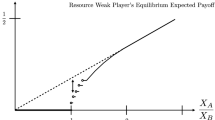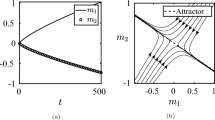Abstract
(3, 2)-Simple games are a model for voting situation in which players can vote not only in favour or against a proposal but they can also abstain. Also in this model, power indices are used to evaluate the power of players. In particular, the Banzhaf index and the Shapley–Shubik index have been generalized to define analogous power indices in the context of games with abstention. In this work we provide a new axiomatization of the Banzhaf index for games with abstention, to underline its properties and increase the justification of the use of this index as a solution concept also in the family of games with abstention.
Similar content being viewed by others
Notes
For simple games, super-additivity is equivalent to the condition of being proper: it is not possible that a coalition and its complement are both winning.
To simplify the notation we omit the braces to denote the sets in a tripartition, for instance the informal notation (a, b, c) stands for \((\{a\},\{b\},\{c\}) \).
We use \(S \subset T\) if \(S\subseteq T\) and \(S\ne T\).
This property is analogous to the Symmetric gain-loss axiom defined in Laruelle and Valenciano (2001) for simple games.
References
Albizuri MJ (2001) An axiomatization of the modified Banzhaf Coleman index. Int J Game Theory 30(2):167–176
Banzhaf JF (1964) Weighted voting doesn’t work: a mathematical analysis. Rutgers L Rev 19:317–343
Barua R, Chakravarty SR, Roy S (2005) A new characterization of the Banzhaf index of power. Int Game Theory Rev 7(4):545–553
Dubey P (1975) On the uniqueness of the Shapley value. Int J Game Theory 4(3):131–139
Dubey P, Shapley LS (1979) Mathematical properties of the Banzhaf power index. Math Oper Res 4(2):99–131
Felsenthal DS, Machover M (1996) Alternative forms of the Shapley value and the Shapley–Shubik index. Public Choice 87(3):315–318
Felsenthal DS, Machover M (1997) Ternary voting games. Int J Game Theory 26(3):335–351
Felsenthal DS, Machover M (1998) The measurement of voting power. Edward Elgar, Cheltenham
Feltkamp V (1995) Alternative axiomatic characterizations of the Shapley and Banzhaf values. Int J Game Theory 24(2):179–186
Freixas J (2005a) Banzhaf measures for games with several levels of approval in the input and output. Ann Oper Res 137(1):45–66
Freixas J (2005b) The Shapley-Shubik power index for games with several levels of approval in the input and output. Decis Support Syst 39(2):185–195
Freixas J, Lucchetti R (2016) Power in voting rules with abstention: an axiomatization of a two components power index. Ann Oper Res 244(2):455–474
Freixas J, Pons M (2017) Using the multilinear extension to study some probabilistic power indices. Group Decis Negot 26(3):437–452
Freixas J, Zwicker WS (2003) Weighted voting, abstention, and multiple levels of approval. Soc Choice Welf 21(3):399–431
Laruelle A, Valenciano F (2001) Shapley–Shubik and Banzhaf indices revisited. Math Oper Res 26(1):89–104
Lehrer E (1988) An axiomatization of the Banzhaf value. Int J Game Theory 17(2):89–99
Monderer D, Samet D (2002) Variations on the Shapley value. Handb Game Theory Econ Appl 3:2055–2076
Nowak AS (1997) On an axiomatization of the Banzhaf value without the additivity axiom. Int J Game Theory 26(1):137–141
Penrose LS (1946) The elementary statistics of majority voting. J R Stat Soc 109(1):53–57
Shapley LS (1953) A value for n-person games. Contrib Theory Games 2(28):307–317
Shapley LS, Shubik M (1954) A method for evaluating the distribution of power in a committee system. Am Polit Sci Rev 48(3):787–792
Acknowledgements
The author is grateful to Roberto Lucchetti and Josep Freixas which provided some ideas to develop this work and she would also like to thank two anonymous referees for their helpful comments, which allowed to improve the final version of the paper.
Author information
Authors and Affiliations
Corresponding author
Rights and permissions
About this article
Cite this article
Bernardi, G. A New Axiomatization of the Banzhaf Index for Games with Abstention. Group Decis Negot 27, 165–177 (2018). https://doi.org/10.1007/s10726-017-9546-6
Published:
Issue Date:
DOI: https://doi.org/10.1007/s10726-017-9546-6




